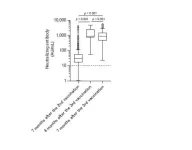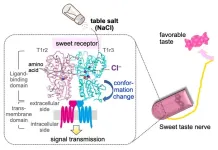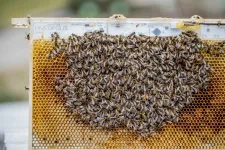Closed loop for circular economy: new polymer recycling strategy ensures both high stability and complete recyclability
The concept, which uses polymer microparticles, results in fully recyclable polymer films with high mechanical stability and fracture energy
2023-03-23
(Press-News.org) The ever-increasing generation of plastic solid waste has resulted in global plastic pollution both on land and in the oceans. Projections show that plastic waste will double in the next 20 years, causing further environmental problems. Large amounts of plastic waste are, at present, incinerated or deposited in landfills. This not only degrades the environment but also depletes valuable resources.
In this light, recycling plastics such as polymers is a promising sustainable alternative for waste management. But this involves the breaking of chemical bonds between monomers (building blocks of polymers), which diminishes their overall stability and quality. Addressing this concern, researchers have developed methods to recycle polymers in a “closed loop”, that is, without the loss of these properties. However, these methods are complicated and expensive and require specialized monomers, necessitating further innovation.
In this direction, a group of researchers led by Daisuke Suzuki, an Associate Professor at Shinshu University, has recently proposed a closed-loop recycling process based on polymer microparticles. Their work, co-authored by Dr. Takumi Watanabe and Dr. Haruka Minato of Shinshu University, has been published in the journal Green Chemistry.
Prof. Suzuki briefly explains the rationale behind their strategy: “Recycling materials without deterioration (closed-loop recycling) is attractive in terms of reducing anthropogenic waste. However, this currently remains very difficult given that there usually is a trade-off between mechanical stability and degradability of polymer materials. Our material recycling concept with microparticles enables the recycling of a huge amount of functional polymer materials that we use in our day-to-day lives and has the potential to solve the problems of resource depletion and environmental pollution.”
In their study, the authors prepared polymer microparticles via the aqueous emulsion polymerization of methyl acrylate (MA) monomers in water, which resulted in polymer chains. These aggregated to form a solution containing uniform spherical poly-MA microparticles. The solution was then dried to get a thin polymer film with physical (as opposed to chemical) cross-linking among the microparticles, which could be reobtained by dissolving the film in ethanol. These recycled microparticles, in turn, could be reused to form various recycled materials.
The films synthesized in this work exhibit several desirable properties, which they retain upon recycling. They have high mechanical stability and fracture energy, which is an indicator of their toughness. The latter property increases with the interfacial thickness between the poly-MA microparticles. This, in turn, decreases with the degree of interparticle cross-linking but increases upon heating the film.
The researchers further enhanced the fracture energy of the polymer films by mixing the microparticles with silica nanofillers. Moreover, adding colored pigments gave the resulting composite films tunable optical properties, which did not diminish upon recycling. These results suggest that closed-loop recycling based on polymer microparticles will enable resource circulation for polymers as well as numerous other composite materials that contain polymer microparticles to create adhering interfaces between their different layers.
Concludingly, Prof. Suzuki highlights the future potential of the present work. “Our concept can lead to the production of fully recyclable films with high fracture energy. Therefore, it will enable the recycling of huge amounts of various polymer materials, thus reducing plastic waste and potentially solving the problems of environmental degradation and plastic pollution.”
The “closed”-loop recycling strategy certainly “opens” new doors for the efficient and sustainable recycling of polymer materials!
###
About Shinshu University:
Founded in 1949, Shinshu University is a national university nestled under the Japanese Alps in Nagano, known for its stunning natural landscapes. Our motto, Powered by Nature – strengthening our network with society and applying nature to create innovative solutions for a better tomorrow, reflects the mission of fostering promising creative professionals and deepening the collaborative relationship with local communities, which leads up to our contribution to regional development through innovation in various fields. We are working on providing solutions for building sustainable society through interdisciplinary research fields: materials science (carbon, fiber, and composites), biomedical science (for intractable diseases and preventive medicine), and mountain science, and aiming to boost research and innovation capability through collaborative projects with distinguished researchers from across the world. For more information, visit https://www.shinshu-u.ac.jp/english/ and follow us on Twitter @ShinshuUni for our latest news.
END
[Attachments] See images for this press release:
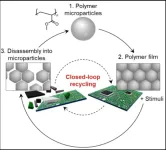
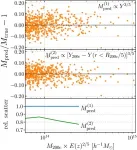
ELSE PRESS RELEASES FROM THIS DATE:
2023-03-23
Astrophysicists at the Institute for Advanced Study, the Flatiron Institute and their colleagues have leveraged artificial intelligence to uncover a better way to estimate the mass of colossal clusters of galaxies. The AI discovered that by just adding a simple term to an existing equation, scientists can produce far better mass estimates than they previously had.
The improved estimates will enable scientists to calculate the fundamental properties of the universe more accurately, the astrophysicists reported March 17, 2023, in the Proceedings of the National Academy of ...
2023-03-23
Booster vaccinations against severe acute respiratory syndrome coronavirus 2 (SARS-CoV-2) are being promoted worldwide to counter the coronavirus disease 2019 (COVID-19) pandemic. Recent studies on the effectiveness of the third dose of the vaccine found improved efficacy against SARS-CoV-2 infection and a reduction in hospitalization. However, most studies on the effect of the third vaccination have been limited to a relatively short period of time after the third dose, and few longitudinal analyses of the effects of the third vaccination with an anti−SARS-CoV-2 vaccine have been reported.
Researchers from Tokyo Metropolitan Institute of Medical ...
2023-03-23
Humans perceive five basic taste sensations: sweet, umami, bitter, salty, and sour. Specific foods trigger taste recognition of these sensations through the activation of different receptors in our taste buds. In the case for table salt, the concentration is also an important factor in determining taste. For instance, the preferable concentration of table salt is 100 mM, at which humans perceive a salty taste. However, higher concentrations of salt, over 500 mM, may be perceived as bitter and/or sour, while very low concentrations, below 10 mM, are perceived as sweet by humans. Scientific ...
2023-03-23
The research published in the Journal of Infection investigated the use of metagenomic next-generation sequencing (mNGS) in diagnosing bloodstream infections (BSIs) for immunocompromised hematology patients. Hematology patients are highly susceptible to BSIs, which can have severe consequences such as septic shock, multiple-organ failure, disseminated intravascular coagulation, and even death. An accurate and quick microbiological diagnosis of BSI is therefore essential for the control of the infection.
In the study, conducted ...
2023-03-23
March 23, 2023 – Despite the broad diversity of the U.S. population, dietary recommendations often overlook the positive contributions of cultural foods to build healthy dietary patterns. This is especially true when it comes to carbohydrate food guidance, where prevailing approaches have historically focused on only three components— carbohydrates, sugar, and dietary fiber—ignoring other important nutrient and cultural considerations. However, a new paper published in Nutrients highlights a more holistic approach, called the Carbohydrate Food Quality ...
2023-03-23
Honeybees are famously finicky when it comes to being studied. Research instruments and conditions and even unfamiliar smells can disrupt a colony’s behavior. Now, a joint research team from the Mobile Robotic Systems Group in EPFL’s School of Engineering and School of Computer and Communication Sciences and the Hiveopolis project at Austria’s University of Graz have developed a robotic system that can be unobtrusively built into the frame of a standard honeybee hive.
Composed of an array of thermal sensors and actuators, the system measures and modulates honeybee behavior through ...
2023-03-23
PARAMUS, N.J. (March 23, 2023) – Octapharma USA has provided a grant for an educational program on pediatric acute-onset neuropsychiatric syndrome (PANS) and PANDAS, a subset of PANS associated with strep, to be held during the National Home Infusion Association (NHIA) Annual Conference scheduled for March 25 – 27 in Washington, D.C.
Octapharma is enrolling more patients and sites for its phase 3 multicenter superiority study comparing the effectiveness of panzyga® (immune globulin intravenous, human - ifas) 10% liquid preparation versus placebo ...
2023-03-23
Continued warming of the climate would see a rise in the number and spread of potentially fatal infections caused by bacteria found along parts of the coast of the United States.
Vibrio vulnificus bacteria grow in warm shallow coastal waters and can infect a cut or insect bite during contact with seawater. A new study led by the UK’s University of East Anglia (UEA) shows that the number of V. vulnificus infections along the East Coast of the US, a global hotspot for such infections, has gone ...
2023-03-23
(SAN ANTONIO) MARCH 23, 2023 - Guenevere Chen, an associate professor in the UTSA Department of Electrical and Computer Engineering, recently published a paper on USENIX Security 2023 that demonstrates a novel inaudible voice trojan attack to exploit vulnerabilities of smart device microphones and voice assistants — like Siri, Google Assistant, Alexa or Amazon’s Echo and Microsoft Cortana — and provide defense mechanisms for users.
The researchers developed Near-Ultrasound Inaudible Trojan, or NUIT (French for “nighttime”) to study how hackers exploit speakers and ...
2023-03-23
UC Riverside scientists have significantly advanced the race to control plant responses to temperature on a rapidly warming planet. Key to this breakthrough is miRNA, a molecule nearly 200,000 times smaller than the width of a human hair.
With moderate increases in temperature, plants grow taller to avoid hotter ground and get fresher air. A landmark study published in the journal Nature Communications demonstrates that microRNA or miRNA is required for this growth. The study also identifies which miRNA molecules — out of more than 100 possibilities — are the essential ones.
“We found that without miRNA plants will not grow, even ...
LAST 30 PRESS RELEASES:
[Press-News.org] Closed loop for circular economy: new polymer recycling strategy ensures both high stability and complete recyclability
The concept, which uses polymer microparticles, results in fully recyclable polymer films with high mechanical stability and fracture energy



